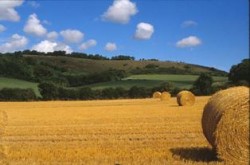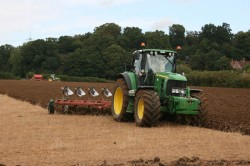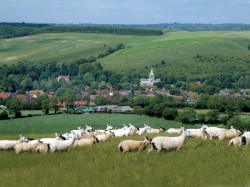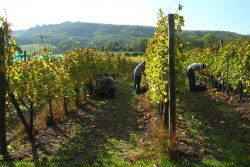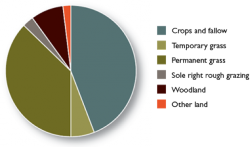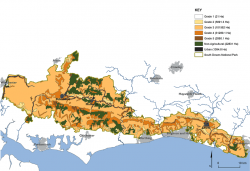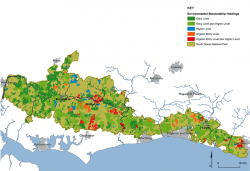Farming, food production and land management have shaped the South Downs over hundreds of years. They help to keep many of the special qualities alive – its landscapes, archaeological features, habitats and species. Past farming practices have made some very important habitats including chalk downland and lowland heath.
Land managers are very important to maintaining the special qualities of the National Park. Many are helping to conserve and improve important habitats through environmental stewardship schemes. Farming is especially important for maintaining and supporting ecosystems services.
Large estates with their designed parklands, have a significant effect on the landscape and the local area. Many of these estates have been in place for a very long time meaning they can take a long term view on land management. This connection between planning and maintenance has lead to a steady and thriving landscape.
Climate change and global markets are likely to have a major impact on farming and land management in the future. Some farmers are changing their businesses by adding tourist accommodation and locally produced food and drink. New enterprises, such as vineyards and wood fuel energy, continue to shape the landscape as the industry adapts to change.
Resources Toolbox
General Interest
All Ages
-

Grey Partridge on the Sussex Downs - Norfolk Estate
Update on the scientific work being carried out to improve the conservation of farmland birds. -

Look after your land with Environmental Stewardship
An interactive pdf document about the Environmental Stewardship Scheme. Includes funding and advice to help farmers undertake work to conserve and improve the countryside. -

Tourism Case Study - The Shepherd’s Hut
A case study of The Shepherd’s Hut looking at the importance of landscape to a tourism business. -

Tourism Case Study Pitlands Barn
A case study of Pitlands Barn looking at farm diversification and responsible tourism practices. -

Why Farming Matters to the South Downs
An education pack filled with information, activities and lesson ideas for learning about farming in the South Downs National Park.
EYFS
Ages 1–5
Pre School
Key Stage 1
Ages 5–7
Years 1 and 2
-

Farmers Market
An activity to introduce the planning behind your own farmers market at school. -

Learning Outside the Classroom in Upham Primary
A case study showing how Upham Primary blends their school grounds with experiential learning in their local area. Years one and two study food and farming - a very topical and accesible subject with many opportunities to get outside. -

Why Farming Matters to the South Downs
An education pack filled with information, activities and lesson ideas for learning about farming in the South Downs National Park.
Key Stage 2
Ages 7–11
Years 3, 4, 5 and 6
-

Farmers Market
An activity to introduce the planning behind your own farmers market at school. -

Maths Challenge - Farming
An activity sheet to be used as a quiz or as part of lessons to calculate population fo livestock. Could be extended by exploring patterns and drawing graphs. -

Why Farming Matters - Activity Pack
Welcome to Why Farming Matters, a teaching resource containing a wealth of activity ideas for Key Stage 2 classes. Teachers can select individual activities or deliver them all as part of a topic on food and farming. Why Farming Matters is a collaborative project by Farming & Countryside Education (FACE) and the National Farmers' Union (NFU). -

Why Farming Matters to the South Downs
An education pack filled with information, activities and lesson ideas for learning about farming in the South Downs National Park.
Key Stage 3
Ages 11–14
Years 7, 8 and 9
Key Stage 4
Ages 14–16
Years 10 and 11
-

Grey Partridge on the Sussex Downs - Norfolk Estate
Update on the scientific work being carried out to improve the conservation of farmland birds. -

Introduction to farming power point presentation
A presentation to introduce farming within the South Downs National Park. -

NGOET Grey Partridge Presentation
An excellent presentation about the conservation of the grey partridge on farmland from the National Gamekeepers Organisation Education Trust. Contains a case study from the Norfolk Estate, illustrated by figures and maps. -

Single Payment and Diversification Case Study
A Case Study of the Sompting Estate and how they use Single Payment and diversification. -

Tourism Case Study - The Shepherd’s Hut
A case study of The Shepherd’s Hut looking at the importance of landscape to a tourism business. -

Tourism Case Study Pitlands Barn
A case study of Pitlands Barn looking at farm diversification and responsible tourism practices.
Key Stage 5
Ages 16–18
Years 12 and 13
-

Grey Partridge on the Sussex Downs - Norfolk Estate
Update on the scientific work being carried out to improve the conservation of farmland birds. -

NGOET Grey Partridge Presentation
An excellent presentation about the conservation of the grey partridge on farmland from the National Gamekeepers Organisation Education Trust. Contains a case study from the Norfolk Estate, illustrated by figures and maps. -

Single Payment and Diversification Case Study
A Case Study of the Sompting Estate and how they use Single Payment and diversification. -

Tourism Case Study - The Shepherd’s Hut
A case study of The Shepherd’s Hut looking at the importance of landscape to a tourism business. -

Tourism Case Study Pitlands Barn
A case study of Pitlands Barn looking at farm diversification and responsible tourism practices.
HE & FE
Higher and Further Education
-

Grey Partridge on the Sussex Downs - Norfolk Estate
Update on the scientific work being carried out to improve the conservation of farmland birds. -

Introduction to farming power point presentation
A presentation to introduce farming within the South Downs National Park. -

Look after your land with Environmental Stewardship
An interactive pdf document about the Environmental Stewardship Scheme. Includes funding and advice to help farmers undertake work to conserve and improve the countryside. -

NGOET Grey Partridge Presentation
An excellent presentation about the conservation of the grey partridge on farmland from the National Gamekeepers Organisation Education Trust. Contains a case study from the Norfolk Estate, illustrated by figures and maps. -

Single Payment and Diversification Case Study
A Case Study of the Sompting Estate and how they use Single Payment and diversification.


